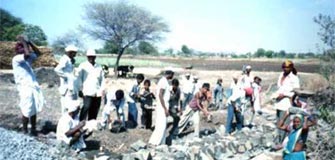Ashok Rupner hails from Surodi village, in the district of Ahmednagar in Maharashtra. Typical of that part of India that has still to see the light of development, Surodi is a village with no doctor, no school and no post office. The approach road to this village of 600 people is in poor condition. Most importantly, there is no tap water here, and the wells dry up with the advent of summer. For a major part of the year, the villagers have to depend on tankers for water. In this scenario, Ashok Rupner decided he would do something - to improve at least the water situation in his village. He found support for this endeavour from Vidnyanvahini, a Pune-based non-profit organisation, of which he is a fulltime member. Vigyanvahini is the brainchild of Pushpa and Madhukar Deshpande, a couple who came back to their homeland after a three-decade-long sojourn in the United States.
The Deshpandes returned with a resolve to throw themselves into voluntary work, and one of the activities that they successfully undertook was bridging the gap between urban and rural education in Maharashtra. Realising the sorry state of science education in in the villages due to a lack of laboratory apparatus, Vidnyanvahini came up with the novel idea of a Mobile Science Laboratory (MSL) in 1995. This provided the village kids with the opportunity to perform scientific experiments that were hitherto unavailable to them because of poor resources.

![]() Villagers prepare small stones using a blasting machine from an old mine.
Villagers prepare small stones using a blasting machine from an old mine.
Rupner is an invaluable member of the Vidnyanvahini Dialogue and Action Group and a regular worker on the MSL project. He was fully aware that though Vidnyanvahini's primary function was to spread science awareness among rural children, it also supported other development efforts. Consequently, he thought of channelising some of the group's efforts towards watershed development in his village. Vidnyanvahini arranged for some of the villagers to be taken to Ralegan Siddhi and Hivre Bazaar, considered model villages for their community development activities. On listening to eminent personalities like Anna Hazare and Popatrao Pawar, the villagers of Surodi realised that similar watershed activities could be carried out in their village too in order to harness rain water. Vidnyanvahini then approached the Association for India's Development for funding support, and AID's Pittsburgh chapter provided $6000 for this effort.
It was decided to begin by rebuilding some old and worn out bunds and then build new ones. This would trap rainwater that could percolate and recharge dried up wells. Vidnyanvahini's MSL visited Surodi in January 2002 and brought engineers to survey the proposed bunds. Digging began for the bunds and then the actual construction. The villagers not only participated in the planning and discussion of the project, but also chipped in with actual shramdaan, with the result that 65% of the proposed bunds have now been constructed.
"We haven't been able to see much visible impact of our work, because last year the village received only two inches instead of the usual 12 inches of rain," says Madhukar Deshpande. "But the wells had water till much later than usual, and that was one sign that we had been successful," he continues. "What is really commendable is that people participated whole-heartedly. Not only did they contribute their labour, but also went around and collected an amount of Rs. 25,000," he points out.
The whole exercise was also instrumental in evoking a sense of self-pride amongst the villagers. They decided to participate in the Sant Gadge Maharaj Gram Swachata Abhiyaan, a cleanliness drive initiated by the Maharashtra State Government in the rural areas. The villagers cleaned the village, plucked out poisonous weeds, cleared stagnant water, and were for their efforts were awarded the first prize in their group. They notched up Rs. 10,000 and the money was again directed towards village improvement activities.
"The villages around seem to have been inspired by all this happening at Surodi," says Deshpande. A number of villagers from the neighbourhood have asked for assistance to set up similar watershed development activity in their villages. "But we are cautious about taking it up; there needs to exist visible participation from the people and the gram panchayat." The government did not take much cognisance of the work going on at Surodi till the end of the shramdaan. "It was only then that they came up and organised a gram sabha to speak out about our work. The local MLA donated one lakh rupees for the renovation of the village's gram panchayat building," adds Deshpande.
701-B, Kshitij,
Plot No. 87 A-1,
Sahakarnagar No. 2,
Pune - 411009.
Phone: 020-4222127/4224865
Email: (Dr. Madhukar Deshpande) madhu36@vsnl.com
Website: http://members.aol.com/Vvahini.
Vidnyanvahini, along with another non-profit organisation called Hello India, is now working on a permanent science centre at Audur in Osmanabad district. "We hope that students from the neighbouring schools will visit the centre a number of times a year to perform experiments or carry out some continued project of their choice. We also envisage this as a discovery kind of museum in which the villagers can gain some insight into science. Another area we hope to include there is agricultural advice to farmers on different aspects of farming such as water and soil testing," says Deshpande.
With each new step, the Deshpandes' dream of giving back something to their homeland comes even more true.























